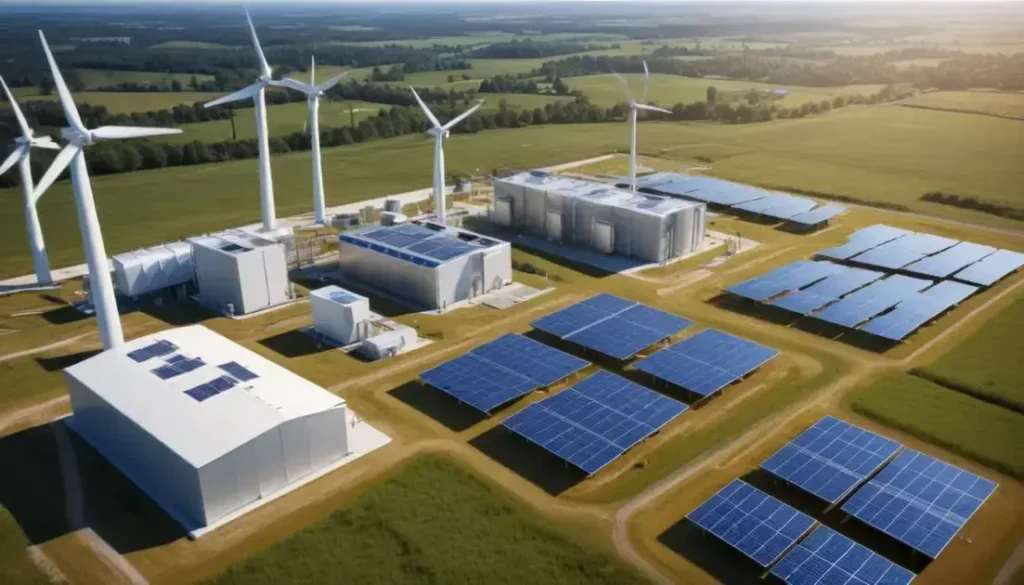The future of UK manufacturing in 2030 will focus on digital transformation, sustainability, and workforce development, as companies adopt advanced technologies, eco-friendly practices, and strategic planning to navigate market changes and consumer demands.
Sustainability is at the forefront of industrial evolution. In Chicago, leaders discussed technologies that can transform industries and reduce emissions. What can UK manufacturers learn?
Introduction to Sustainability in Chicago
Chicago has emerged as a pivotal hub for discussions on sustainability, bringing together industry leaders and innovators. The city hosts various events that focus on strategic approaches to environmental challenges and the future of sustainable practices. This environment encourages collaboration amongst businesses and government entities.
At these events, knowledge sharing is vital. Participants explore the latest technologies that aim to minimise environmental impact while boosting operational efficiency. Innovations such as smart manufacturing, energy-efficient processes, and waste reduction strategies are hot topics, allowing firms to meet stringent regulations while enhancing their competitive advantage.
Moreover, attendees often discuss the shifting consumer expectations around sustainability. Modern customers are increasingly conscious of their purchasing decisions; they prefer brands that are transparent about their environmental impact. This shift necessitates that businesses actively engage in sustainability initiatives, creating a responsible image that resonates with eco-aware consumers.
Networking is also a key element of these gatherings. Connections formed can lead to partnerships that drive sustainability initiatives forward. As companies align their goals with sustainability objectives, the potential for innovation and market growth becomes limitless.
Eryn Devola’s Role at Siemens
Eryn Devola plays a crucial role at Siemens, focusing on integrating sustainability with technological advancements. Her work involves spearheading initiatives that align with the company’s commitment to environmental responsibility. This includes developing strategies to reduce emissions across manufacturing processes.
In her position, Eryn emphasises the importance of collaboration between different sectors. By fostering partnerships, she aims to enhance innovation and implement best practices in sustainability. This collaborative approach allows for a combination of expertise, driving significant progress in the industry.
One of her key projects involves introducing advanced energy solutions. These innovations not only improve efficiency but also significantly lower the carbon footprint of industrial operations. By utilising state-of-the-art technology, Siemens can demonstrate its leadership in sustainability efforts.
Eryn also actively engages with clients to provide tailored solutions that meet their sustainability goals. Through comprehensive assessments, she identifies opportunities for improvement and guides businesses on their journey to becoming more environmentally friendly. Her proactive approach ensures that Siemens remains at the forefront of the sustainability movement.
Decarbonising Tough Industries
Decarbonising tough industries is a critical challenge facing modern manufacturing sectors. These industries, such as cement, steel, and chemical production, are significant contributors to global greenhouse gas emissions. Addressing this issue requires innovative approaches and strong commitment to sustainability.
Technology plays a vital role in reducing emissions in these sectors. Advanced solutions like carbon capture and storage (CCS) are increasingly being implemented. These technologies can trap carbon dioxide emissions and store them safely underground, significantly lowering the overall carbon footprint.
Moreover, renewable energy sources are gaining traction as companies aim to transition away from fossil fuels. By harnessing solar, wind, and hydroelectric power, industries can reduce reliance on carbon-intensive energy, further mitigating emissions. Such a shift is essential for achieving ambitious climate targets.
Collaboration among stakeholders is also crucial. Governments, businesses, and researchers must work together to develop regulations, share best practices, and drive innovation. By fostering an environment of cooperation, the industry can expedite the transition towards sustainable practices that benefit both the economy and the environment.
Technology’s Impact on Emissions
Technology has a profound impact on reducing emissions across various industries. By adopting innovative solutions, businesses can dramatically lower their carbon footprints while enhancing operational efficiency. One notable advancement is the integration of smart sensors and IoT devices, which monitor energy usage in real-time, allowing for optimisations that directly affect emissions levels.
Furthermore, automation technologies such as robotics streamline production processes. By refining workflows and increasing precision, these systems reduce waste and energy consumption. Manufacturers can achieve significant reductions in operational emissions by aligning their production strategies with eco-friendly practices.
Another critical aspect is the transition to renewable energy sources. Technologies that harness solar, wind, and hydroelectric power enable companies to shift away from fossil fuels, which are major contributors to greenhouse gas emissions. This transition not only mitigates environmental impact but often results in cost savings over time.
Additionally, advancements in carbon capture and storage (CCS) technology are making it possible to trap CO2 emissions from industrial processes before they enter the atmosphere. This innovative approach supports industries in meeting stringent regulations while committing to sustainability.
Siemens’ Approach to Sustainability
Siemens adopts a comprehensive approach to sustainability, integrating environmental, social, and governance (ESG) principles across all operations. The company’s commitment is evident in its efforts to reduce carbon emissions while promoting innovation in sustainable technologies. By focusing on energy efficiency, Siemens invests heavily in solutions that not only improve productivity but also minimise their environmental impact.
The company has implemented various initiatives aimed at achieving tangible results. These include developing intelligent infrastructure that optimises resource use in buildings and manufacturing facilities. By harnessing data analytics and smart technologies, Siemens enables its clients to significantly lower their energy consumption.
Additionally, Siemens collaborates with partners globally to establish best practices in sustainable practices. Through these partnerships, it aims to drive change across entire supply chains, ensuring that sustainability extends beyond its own operations. This holistic view is critical in addressing complex environmental challenges faced by industries today.
Furthermore, Siemens is committed to transparency in its sustainability efforts. The company regularly publishes detailed reports on its progress and challenges, enabling stakeholders to assess its performance. This open communication fosters trust among clients, investors, and the wider community, reinforcing Siemens’ position as a leader in sustainability.
Customer Engagement through Tools
Effective customer engagement is essential for businesses looking to enhance loyalty and drive sales. Companies are increasingly using advanced digital tools to foster stronger relationships with customers. These tools enable businesses to understand customer preferences and behaviour, creating personalised experiences that resonate.
One common approach involves employing customer relationship management (CRM) systems. These systems gather data from various touchpoints, providing insights into customer interactions. By analysing this data, businesses can tailor communications and offers that align with individual customer needs, thereby boosting engagement.
Another key strategy is leveraging social media platforms. Businesses can engage with customers directly, responding to queries in real-time and fostering a sense of community. This interaction not only enhances brand loyalty but also encourages customers to become advocates for the brand by sharing their positive experiences.
Furthermore, companies are adopting AI-driven chatbots and virtual assistants. These tools can handle inquiries 24/7, providing instant support that enhances the overall customer experience. By automating routine tasks, businesses free up human resources to focus on more complex customer interactions.
The Importance of Industry Events
Industry events play a crucial role in fostering innovation and collaboration within various sectors. These gatherings serve as platforms where professionals can exchange ideas, showcase new technologies, and discuss the latest trends. By attending these events, participants gain valuable insights into market dynamics and customer expectations.
One significant benefit of industry events is the opportunity for networking. Professionals can connect with peers, potential clients, and thought leaders. These connections can lead to partnerships, collaborations, and new business opportunities, ultimately enhancing a company’s reach and influence in the market.
Furthermore, industry events often feature keynote speakers and panel discussions that highlight best practices and case studies. Participants can learn about successful strategies implemented by others in their field, allowing them to adopt and adapt techniques that drive growth and sustainability.
Additionally, these events provide a unique environment for companies to showcase their innovations. Exhibitors can demonstrate their latest products and services, attracting attention from industry stakeholders and potential customers. This visibility is essential for establishing a brand’s reputation and authority.
Sustainability Trends Observed
Recent years have witnessed a significant shift in sustainability trends across various industries. Companies are increasingly prioritising eco-friendly practices, reflecting a growing awareness of environmental issues among consumers. This shift often involves adopting circular economy principles, where waste is minimised, and resources are reused and recycled.
One notable trend is the rise of green technology. Innovations such as energy-efficient buildings, renewable energy solutions, and sustainable transportation systems are becoming mainstream. Businesses are investing in technologies that not only reduce their carbon footprint but also enhance operational efficiency and competitiveness.
Another key trend is the focus on transparency and accountability. Consumers demand to know where their products come from and how they are made. As a result, companies are increasingly transparent about their supply chains and sustainability practices, showcasing their efforts through detailed reporting and certifications.
Furthermore, the integration of sustainability into corporate strategy has become essential. Companies recognise that long-term viability relies on adapting to environmental changes and meeting regulatory standards. This proactive approach not only mitigates risks but also positions organizations favorably in a rapidly evolving market.
Future of Sustainability in 2030
The future of sustainability in 2030 promises to be transformative, with businesses and governments increasingly recognising the importance of addressing environmental challenges. By 2030, sustainability is expected to become deeply embedded in corporate strategies, influencing all aspects of decision-making. Companies will likely prioritise innovative practices that minimise their carbon footprints and enhance resource efficiency.
Advancements in technology will play a crucial role in this evolution. Emerging solutions, such as smart grids, artificial intelligence, and blockchain, will enable organisations to optimise energy use and track the sustainability of their supply chains. These technologies will empower businesses to make data-driven decisions that align with their sustainability goals.
The concept of a circular economy will also gain ground, where waste is eliminated, and products are reused, refurbished, or recycled. By 2030, many industries will shift their focus from linear production systems to circular models, fostering long-term sustainability while simultaneously driving economic growth.
Moreover, consumer preferences will continue to evolve, with more individuals choosing brands that demonstrate genuine commitment to sustainability. Companies that embrace transparency and accountability will gain a competitive edge, positioning themselves as leaders in the sustainable market.
What’s Next for UK Manufacturers?
As the manufacturing landscape evolves, UK manufacturers must navigate numerous challenges and opportunities. A key focus will be on embracing digital transformation. This involves adopting advanced technologies such as automation, artificial intelligence, and the Internet of Things (IoT) to enhance efficiency and productivity. By leveraging these innovations, manufacturers can optimise processes and respond more effectively to market demands.
Another critical aspect is sustainability. UK manufacturers are increasingly prioritising eco-friendly practices to meet regulatory requirements and consumer expectations. This shift towards sustainable manufacturing includes reducing waste, improving energy efficiency, and utilising sustainable materials. Companies that successfully integrate these practices will not only help the environment but also gain a competitive edge.
Moreover, the post-Brexit landscape presents both challenges and opportunities. Manufacturers will need to adapt to new trade agreements and navigate shifting supply chains. By developing strong local supply chains and exploring new markets, UK manufacturers can position themselves for growth in a changing economic environment.
Finally, workforce development will be essential. Investing in training and upskilling employees will ensure that the workforce is equipped to handle new technologies and processes, fostering innovation and resilience in the sector.
The Future for UK Manufacturers
In conclusion, the future for UK manufacturers holds great potential, driven by innovation, sustainability, and adaptability. As businesses embrace digital technologies and focus on sustainable practices, they will be better equipped to meet the challenges of the modern market.
By investing in advanced technologies, manufacturers can enhance efficiency and productivity, making their operations more competitive. Additionally, prioritising eco-friendly practices will not only comply with regulations but also resonate with increasingly conscious consumers.
Moreover, adapting to the changing landscape after Brexit will require resilience and strategic planning. By nurturing local supply chains and exploring new markets, UK manufacturers can seize new opportunities for growth.
Finally, workforce development is essential. Ensuring that employees are skilled and ready for the future will foster innovation and continuous improvement in the manufacturing sector.
With these strategic approaches, UK manufacturers can look forward to a vibrant and successful future.
Frequently Asked Questions
What are the key trends driving sustainability in UK manufacturing?
Key trends include the integration of digital technologies, a focus on eco-friendly practices, and the importance of building transparent supply chains that cater to environmentally conscious consumers.
How can digital transformation benefit manufacturers?
Digital transformation enhances operational efficiency, reduces costs, and improves responsiveness to market demands by leveraging advanced technologies such as automation and IoT.
What role does workforce training play in the future of manufacturing?
Workforce training is crucial for equipping employees with the necessary skills to adapt to new technologies and processes, ensuring competitiveness and fostering innovation.
How does sustainability affect consumer choice?
Consumers are increasingly choosing brands that demonstrate a commitment to sustainability. This trend influences purchasing decisions and encourages companies to adopt eco-friendly practices.
What impact has Brexit had on UK manufacturers?
Brexit has created both challenges and opportunities, prompting UK manufacturers to adapt to new trade agreements and reconsider their supply chain strategies to remain competitive.
How can manufacturers ensure their sustainability efforts are successful?
By setting clear goals, regularly assessing their environmental impact, and engaging stakeholders in sustainability initiatives, manufacturers can enhance their commitment to eco-friendly practices.


